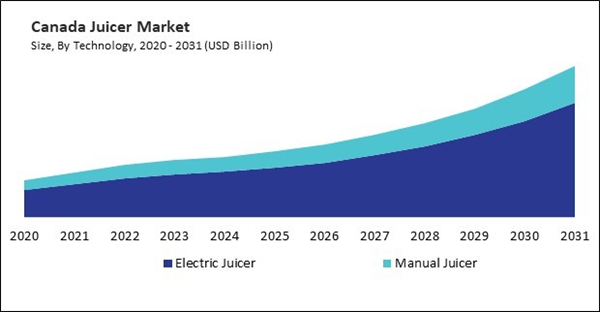Electric juicers are powered by motors, making them convenient and easy to use, especially for high-volume juicing. These juicers offer a variety of features, including adjustable speeds, automatic pulp ejection, and large feeding tubes for less preparation. They are particularly favored by consumers who value convenience, speed, and consistency in their juice extraction. Thus, the Canada market is expected to be utilized 1.40 million units of electric juicers by the year 2031.
The US market dominated the North America Juicer Market by country in 2023, and is expected to continue to be a dominant market till 2031; thereby, achieving a market value of $1.16 billion by 2031. The Canada market is experiencing a CAGR of 13.9% during 2024-2031. Additionally, the Mexico market is expected to exhibit a CAGR of 13.7% during 2024-2031.
The shape of consumer preferences and the growth of the juicer market are significantly influenced by digital platforms and social media. Social media and digital platforms like Instagram, YouTube, and TikTok have played a transformative role in popularizing juicing. Influencers like @medicalmedium and @fullyrawkristina on Instagram share visually stunning juice recipes and health benefits, inspiring millions to adopt juicing as part of their daily routine.
Additionally, platforms like YouTube offer in-depth tutorials from channels like “Juicing for Health” and “John Kohler’s OKRaw,” educating consumers on juicer types, techniques, and the nutritional value of fresh juices. With its engaging short videos, TikTok has brought juicing trends to younger audiences through viral recipes like watermelon mint juice and green detox shots.
The juicer market in the United States is experiencing robust growth, driven by the population's increasing focus on health and wellness. According to the Centers for Disease Control and Prevention (CDC), nearly half of U.S. adults meet the guidelines for aerobic physical activity, reflecting a widespread interest in maintaining physical health. This focus on healthy living has extended to dietary choices, with more individuals opting for fresh, homemade juices to supplement their nutritional needs. Juicers with advanced features like cold-press technology, nutrient retention, and user-friendly designs are particularly in demand. The rising awareness of the role of fresh juices in preventing lifestyle diseases such as obesity and heart disease has further solidified the popularity of juicers in the U.S. market.
List of Key Companies Profiled
- Breville Group Limited
- Wonderchef Home Appliances Pvt. Ltd.
- Newell Brands, Inc.
- Robert Bosch GmbH (BSH Home Appliances Corporation)
- AB Electrolux
- Koninklijke Philips N.V.
- Panasonic Holdings Corporation
- SMEG S.p.A.
- Whirlpool Corporation
- De'Longhi Appliances S.r.l
Market Report Segmentation
By Technology (Volume, Thousand Units, USD Billion, 2020-2031)- Electric Juicer
- Manual Juicer
- Supermarket & Hypermarket
- Specialty Stores
- Online
- Other Distribution Channels
- Centrifugal Juicer
- Masticating Juicer
- Triturating Juicer
- US
- Canada
- Mexico
- Rest of North America
Table of Contents
Companies Mentioned
- Breville Group Limited
- Wonderchef Home Appliances Pvt. Ltd.
- Newell Brands, Inc.
- Robert Bosch GmbH (BSH Home Appliances Corporation)
- AB Electrolux
- Koninklijke Philips N.V.
- Panasonic Holdings Corporation
- SMEG S.p.A.
- Whirlpool Corporation
- De'Longhi Appliances S.r.l









